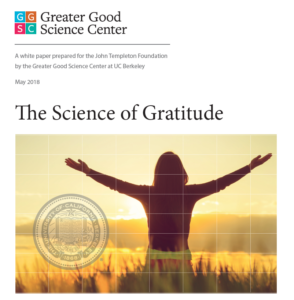Individual Counseling Insights From Westlake Village-Based Patricia McTague-Loft
Happy Thanksgiving! Many people say this is their favorite holiday, remarking how low stress it is. Of course, most of these people aren’t the primary cooks! Kidding aside, the whole point of the day, aside from eating, is sitting down with family and friends, catching up on news if you haven’t seen someone in a while — and expressing gratitude. That’s literally the definition of the day.

Somehow, it just feels good to express gratitude. Many families have a ritual where one by one people at the dinner table express one thing they’re grateful for. Some people (we’re looking at you, teenagers) can make some silly comments about gratitude, but oftentimes this is the one chance all year for a person to simply say think you to another family member.
So what it is about gratitude that makes it so uplifting? “Throughout history and around the world, religious leaders and philosophers have extolled the virtue of gratitude. Some have even described gratitude as ‘social glue’ that fortifies relationships — between friends, family, and romantic partners — and serves as the backbone of human society.” Well, that’s quite a statement! In fact, Summer Allen, Ph.D., made that statement in an article written for the John Templeton Foundation and published on UC Berkeley’s website – the Greater Good Science Center. The title of the article? The Science of Gratitude.
That’s right, gratitude is the subject of serious and rigorous academic study. It turns out that gratitude has biological roots and rewards grateful people in a variety of ways. “Research suggests that gratitude may be associated with many benefits for individuals,” writes Allen, “including better physical and psychological health, increased happiness and life satisfaction, decreased materialism, and more.
“A handful of studies suggest that more grateful people may be healthier, and others suggest that scientifically designed practices to increase gratitude can also improve people’s health and encourage them to adopt healthier habits.”
Allen goes on to say, “Gratitude may also benefit people with various medical and psychological challenges. For example, one study found that more grateful cardiac patients reported better sleep, less fatigue, and lower levels of cellular inflammation, and another found that heart failure patients who kept a gratitude journal for eight weeks were more grateful and had reduced signs of inflammation afterwards. Several studies have found that more grateful people experience less depression and are more resilient following traumatic events.”
Who knew gratitude could be analyzed in such wide-ranging fashion? But Allen does exactly that, discussing cultural factors linked to gratitude, the social benefits of gratitude and gratitude “interventions” (keeping a gratitude journal, for example).
If you’d like to read Allen’s full article, download the PDF here. Even if you don’t read the entire paper, it includes an Executive Summary that is quite interesting.
In any case, simply following the old maxim — develop an attitude of gratitude — is a wonderful way to live. Happy Thanksgiving!